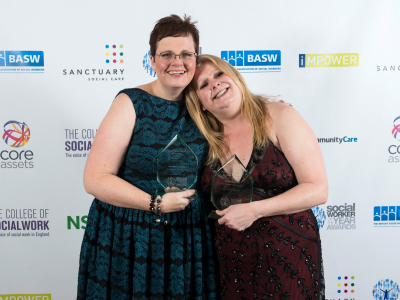
Winning the Adult Social Worker of the Year accolade at last year’s social work awards wasn’t just a moment of recognition for Birmingham Council’s Joanne Lowe, it also provided the confidence boost she needed to take the next step in her social work career.
“I applied for a team manager role and was successful,” she says. “It was a really positive experience and I might not have gone for anything like that if I hadn’t won the award.
“It helped me change my perception of myself. I’m not the most confident of people – it might come across like that, but I’m not – so winning really boosted my confidence.”
Lowe secured a temporary role managing the council’s new quality team, which she says helped tie the social work side together with the strategic side of the job, before moving into a permanent position managing two of Birmingham’s busiest older adults teams.
“The quality team was a good grounding but this job is totally different – it’s frantic, it’s frenetic, it’s non-stop managing staff,” she says.
‘Rewarding experience’
One month into this role, Lowe’s current priority is to bring some stability to the service, which has recently undergone a significant restructure. “Team sizes are smaller and we’re trying to do more with less resources, so I’m just trying to support people as far as I can.”
Lowe’s no stranger to service reorganisation though. She played a fundamental role when a review of in-patients in long-stay learning disability hospitals in the area led to a decision to close them and transfer patients, many with complex histories, into the community.
“Part of the reason I was nominated for the award was because of this work,” she says. “It was a really rewarding experience.”
‘Difficult times’
Prior to working as a senior practitioner in the learning disabilities team, Lowe worked in mental health services as an approved mental health professional (AMHP) for 11 years. “I used to work in a team called rehab and recovery – we were very active with adults with long-term mental health problems and I would work with the same clients for seven years.
“We would go back five, six times a week to visit people if they were in crisis. Even if it was for five or ten minutes, sometimes you would be the only person these people would see,” she adds. “That’s the bit of social work I really like – just having that interaction, talking to people and listening to their stories.”
Lowe even went so far as to redecorate a client’s house so they could return to a clean and safe environment after being seriously unwell in hospital. She admits it wasn’t easy when the service disbanded.
“That restructure was one of the most difficult times in my career – where they moved social workers out of the teams, away from the NHS and back into councils again,” she says. “It was emotional and disappointing because we knew the benefit of it and we could give testimonies of clients that we’d actually worked with and supported through the process.”
‘Making a difference’
Lowe went on to work as a best interests assessor for three years and has also been a practice educator for the last 12 years. “I tell my students that as a social worker you have a toolkit and in it is you, your own personality – your relationship with the client is part of your toolkit as well,” she says. “If you don’t have a relationship with people then you are not going to be able to make a difference to their lives.”
Developing her colleagues and recognising good practice is something Lowe’s really keen on – perhaps even more so because her own choice to pursue a career in social work wasn’t always welcomed. “My parents fostered for 30 years, they had a lot of experience of social workers and I don’t think it was always positive,” she says.
“So I’ve had a lot of criticism, even from my own family and they were quite cynical about the award,” she adds. “But personally I was really proud. I think it’s really important to nominate staff and for them to know they’ve been recognised – I know how important it was for me.”


 Bournemouth, Christchurch and Poole
Bournemouth, Christchurch and Poole  Hampshire County Council
Hampshire County Council  Lincolnshire County Council
Lincolnshire County Council  Norfolk County Council
Norfolk County Council  Northamptonshire Children’s Trust
Northamptonshire Children’s Trust  South Gloucestershire Council
South Gloucestershire Council  Wiltshire Council
Wiltshire Council  Wokingham Borough Council
Wokingham Borough Council  Children and young people with SEND are ‘valued and prioritised’ in Wiltshire, find inspectors
Children and young people with SEND are ‘valued and prioritised’ in Wiltshire, find inspectors  How specialist refugee teams benefit young people and social workers
How specialist refugee teams benefit young people and social workers  Podcast: returning to social work after becoming a first-time parent
Podcast: returning to social work after becoming a first-time parent  Podcast: would you work for an inadequate-rated service?
Podcast: would you work for an inadequate-rated service?  Family help: one local authority’s experience of the model
Family help: one local authority’s experience of the model  Workforce Insights – showcasing a selection of the sector’s top recruiters
Workforce Insights – showcasing a selection of the sector’s top recruiters 

 Facebook
Facebook X
X LinkedIn
LinkedIn Instagram
Instagram
Comments are closed.